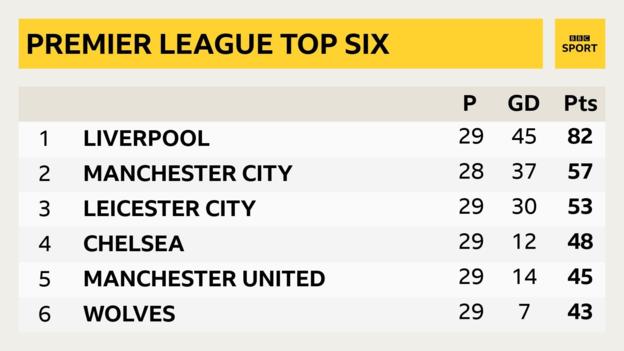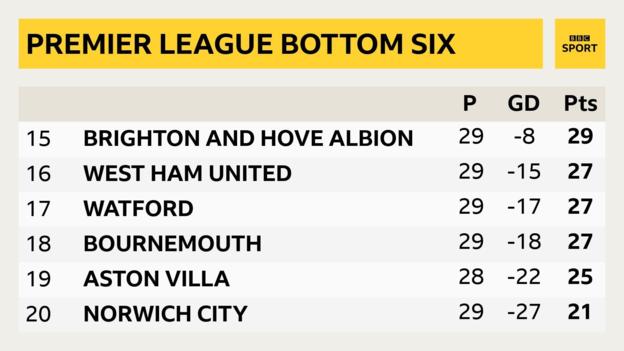One of the major questions on the lips of every football fan is whether the Premier League season will reach its conclusion. But does it actually matter when it comes to the final standings?
All 20 Premier League clubs are committed to finishing the season, but what if that proves impossible? If the campaign cannot be completed, one option could see the table as it stands now (after 29 games for most teams) declared final.
Liverpool would win the title and Leicester and Chelsea would go into the Champions League along with either Manchester City or United depending on how City’s appeal against their European ban goes.
Bournemouth, Aston Villa and Norwich would go down.
BBC Sport has looked back over the previous 10 Premier League seasons to see how much has changed in the final nine games to get a sense of whether those matches actually tend to impact on the table.
Perhaps surprisingly, it turns out the significance of these late-season fixtures is actually fairly minimal.
Looking at title winners, Champions League qualifiers and relegation, an average of just over one of those changes every season during the run-in – that’s 11 differences in 10 years, and only two in the past four.

In the past 10 Premier League seasons, the leaders have changed three times between gameweek 29 and the final table.
Liverpool – 25 points clear at the top – are unlikely to suffer the fate of Chelsea in 2013-14 or Manchester United in 2011-12 or 2009-10.
Chelsea had been seven points clear of anyone at this stage six years ago – albeit having played more games – but ended up in third, four points behind champions Manchester City.
United squandered a one-point lead at the top in 2012 and two points in 2010 as City and Chelsea won those respective titles by narrow margins.
There was only one major change to the table last season between games 29 and 38 as Chelsea moved from sixth to third and United dropped from fourth to sixth.
The Blues did have a game in hand after the 29th round of matches and were only two points behind United, however.
They are one of only two teams in the past decade to take a Champions League spot having not been in the top four with nine rounds left.
In 2012-13 Tottenham squandered a seven-point advantage over Arsenal (who had one game in hand) as Arsene Wenger’s side ended up in the Champions League places instead of their rivals.
That turnaround would still give hope to Manchester United, Wolves, Sheffield United and Tottenham, who are all within seven points of fourth-placed Chelsea – if the season is played to an end.
What has changed at the bottom?

The most common change to the table has been the relegation places – with six changes in the previous 10 years.
Wigan were the great survivors twice, staying up in 2010-11 and 2011-12 having been in the drop zone with nine rounds to go.
The biggest change was the 2010-11 season when Wigan and Wolves escaped and Birmingham and Blackpool went down. Only West Ham failed to get out of the bottom three in the final nine weeks.
In 2011-12 Wigan caught up six points on Blackburn in the closing weeks to send Rovers down. And in 2013-14 Sunderland used their three games in hand (26 games played after 29 rounds) to stay up at the expense of Norwich.
The 2014-15 season saw probably the most consequential survival in Premier League history.
Leicester were bottom of the table, seven points adrift of safety and nine behind Hull at this stage of the season – with just one game in hand. But a remarkable run saw them stay up as Hull went down. The Foxes won the Premier League title the next season.
Perhaps the most comprehensive comeback at this stage came in 2017-18. Swansea were in 13th place and Crystal Palace were 18th after 29 games – albeit only separated by three points. Palace ended up finishing 11th, 11 points above the relegation zone, as Swansea went down.
Those turnarounds would give plenty of hope to Bournemouth and Aston Villa, who are only in the bottom three on goal difference and by two points respectively.
Watford, West Ham and Brighton – all within two points of the relegation zone – would breathe a huge sigh of relief if this table ends up being the final version.
How about the teams promoted into the Premier League?
In the past decade there has been a remarkable lack of difference at the top between the 37th game in the Championship – where we are now – and the final table.
In that time, only Leeds – last season – have failed to earn promotion having been in the top two with nine games to go.
Sheffield United, who had been third, took their place, with Leeds losing in the play-offs.
Aston Villa, who won the play-off final that year, are one of only two teams in the decade to win the play-offs having not been in the top six after 37 games. They were in eighth place, two points behind the play-off spots.
The other team to achieve that feat were Blackpool, who were in ninth at this stage in 2009-10, five points below the top six.
Those figures mean the omens would be good for the top two – Leeds and West Brom – with the likely play-off winners coming from Fulham, Brentford, Nottingham Forest or Preston North End.

The News Editor ,Reporter at Kagadi Kibaale community Radio




